Why the child sweats greatly: the most common causes of hyperhydrosis
Causes of increased sweating in children. Why the child sweats when falling asleep or during sleep? Hyperhydrosis at cold and stress. Are Rahit and CNS Diseases are connected with sweating?
All parents closely follow the development of their children and the slightest violations are a reason for a visit to the doctor. This also applies to abundant sweating. Why the child sweats and sweats even in the cool room during sleep or walk?
Functioning of the system of sweating in children
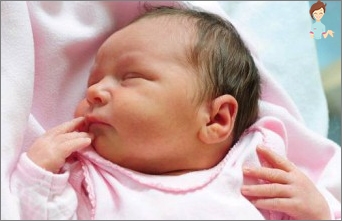 This process in adults and kids is regulated by the autonomic nervous system. However, the infants have immature, like some other organism systems. Sweet glands begin to work only on 3-4 weeks of life. And their development completely ends only by 4-5 years.
This process in adults and kids is regulated by the autonomic nervous system. However, the infants have immature, like some other organism systems. Sweet glands begin to work only on 3-4 weeks of life. And their development completely ends only by 4-5 years.
Therefore, parents who are wondering why the child sweats greatly, may not worry. However, this does not mean that abundant sweating should be observed constantly. This system is not fully developed, but it is functioning, so only periodic failures are allowed.
Increased sweating, or in other words – hyperhydrosis, occurs in crumbs everywhere, which is quite natural for the reason mentioned. In addition, the sweat selection process always begins when the air temperature exceeds 28 °.
Usually sweat acts in certain places – palm and feet, a little less – on the face and in the armpits. Parents must remember that with then the fluid from the body is excreted, so it is necessary to replenish its loss. From the skin of the baby, weighing 5 kg, about 200 ml of liquid can evaporate the day.
Common causes of hyperhydroposis:
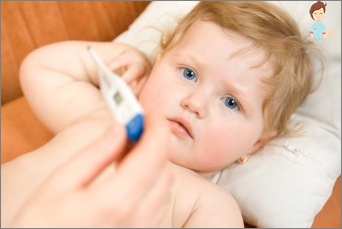 Non-compliance with temperature regime (high air temperature);
Non-compliance with temperature regime (high air temperature);- Synthetic linen;
- Hyperactivity;
- Excess body weight;
- Vitamin D;
- Hereditary activity of sweat glands;
- Hormonal failures;
- Cold;
- Some drugs.
Why a child sweats abundantly when falling asleep
The most banal cause is a room microclimate. Almost all parents are hung hard and dress children, afraid that they frozen during sleep, but the baby can be too hot. Pediatricians recommend starting from 3 weeks of life, wear the baby so, parents themselves dress. Otherwise, hyperhydroposis cannot be avoided, because the body must be cooled in a hot climate.
In addition, you need to pay attention to other phenomena. For example, it is necessary to evaluate how much the child is active during wakefulness. High motor activity leads to increased metabolism and, accordingly, hyperhydrosis.
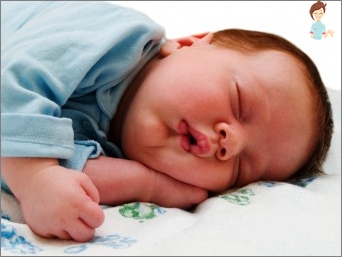 Why a child sweats when sleeping? Perhaps the room needs to adjust the air temperature. Optimal indicators – + 20 °, and humidity should not exceed 60%. Need to get rid of synthetic native and bed linen. Preference is better to give cotton. Synthetic prevents heat transfer that only enhances sweat selection.
Why a child sweats when sleeping? Perhaps the room needs to adjust the air temperature. Optimal indicators – + 20 °, and humidity should not exceed 60%. Need to get rid of synthetic native and bed linen. Preference is better to give cotton. Synthetic prevents heat transfer that only enhances sweat selection.
Dying blankets worth replacing wool. Before bed, it is necessary to ventilate the room, since the stuffiness also contributes to hyperhydrosis. However, the windows and windows can not be left open overnight, as children can catch a cold.
Cold
During the disease, any person can increase body temperature and increase sweating. This is a completely normal physiological process. Parents should not worry about this when cold. Hyperhydrosis during the disease – the natural protective reaction of the body that will not allow the temperature to rise even more, and also contributes to the withdrawal of toxins.
Potting will be restored only after complete recovery. While the body is present in the body, the patient will sweat even without increasing the temperature indicators.
Emotional reason
Children react very sensitively on the emotions of adults, both positive and negative. In this case, the body sweats in the head and neck. Perhaps the reason why the child sweats the neck and the head is hiding in this? To find out this, parents should often spend time with their children, talk to him, play, distract and entertain. Distractions and fatigue relate to emotional stresses, therefore, they can lead to enhanced selection of sweat.
Why the child sweat hands and legs: serious pathologies
A number of diseases include hyperhydrosis in their symptoms, so you need to be attentive and consult a doctor when other signs of illness appear.
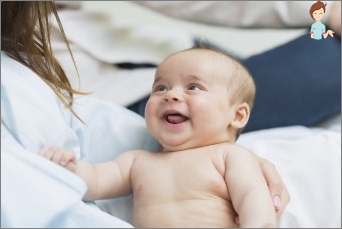 One of the most common reasons is Rahit. The first disturbing symptoms can be seen at the age of 1-2 months. If the crumb sweats heavily when falling asleep, in the area of hair and face, and its sweat has a sour smell, you need to turn to the pediatrician, since these are the first signs of developing pathology. Also rickets are characteristic of constipation. When the child is being worried, respectively sweats.
One of the most common reasons is Rahit. The first disturbing symptoms can be seen at the age of 1-2 months. If the crumb sweats heavily when falling asleep, in the area of hair and face, and its sweat has a sour smell, you need to turn to the pediatrician, since these are the first signs of developing pathology. Also rickets are characteristic of constipation. When the child is being worried, respectively sweats.
Since the head sweats greatly, the baby often rubs his head about the pillow, as a result of which he rolled his hair and ballers. This is due to a change in the composition of sweat, which annoys tender skin. The sweat begins to stand out more and more often, as a result of any activity, even during the sucking of the chest.
Listed phenomena – the first signs of developing rickets. In progression of the disease, an increased excitability is observed, concernsity, anxiety. Kroch can shudder from sudden noise, turn on light, sleep becomes restless, legs and other parts of the body are covered with red spots.
At this time, Rahit is good to treat, studied enough. However, it is easier to prevent the disease than to treat it later. Prevention measures are simple enough: it is more likely to go to the sun, as Vitamin D is an important component of treatment, to eat (nursing the mother, matured to the child), engage in gymnastics, to play robing games, regularly undergo prophylactic examinations from the pediatrician.
Why the child sweat feet and palm: the pathology of the nervous system
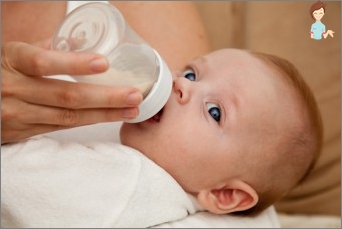 Such diseases are characterized by the absence of a visible cause of hyperhydroz. In addition, there is no glooms of the sweating of only one part of the body, for example, only forehead, or only one palm.
Such diseases are characterized by the absence of a visible cause of hyperhydroz. In addition, there is no glooms of the sweating of only one part of the body, for example, only forehead, or only one palm.
The presence of the disease can be judged by the change in odor and consistency of sweat: it becomes sour and sharp, thick or too liquid, sticky, abundant. All listed features rarely appear all at once, but the presence of several is a reason for a thorough examination.
Hereditary diseases
Power disorders may be provoked by genetic factors. In this case, all secrets produced by the body are changed: saliva, sweat, digestive juices. One of the most common diseases that are transmitted from parents is the fibrosis. Pathology is characterized by a cluster of thick mucus in bronchi, which light can not independently derive.
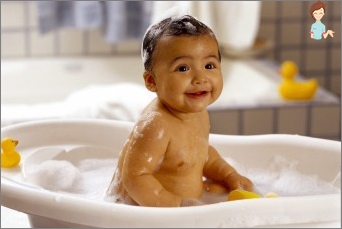 One of the main signs of violation is the change in the composition of sweat: it acquires a salty flavor. Parents may be the first to notice this change, since they often kiss.
One of the main signs of violation is the change in the composition of sweat: it acquires a salty flavor. Parents may be the first to notice this change, since they often kiss.
When symptoms are detected, parents should not panic immediately. Often the reason is quite ordinary situations. Perhaps the kid is too warm clothes, or clothing from synthetics, and in the room it is hot. ATTENTION FREE AND HYGIENE: Daily bathing, regular change of native and bed linen.
In the absence of pathologies, baths with medicinal herbs can help, for example, chamomile and a series. It is not necessary to provoke sweat selection itself: limit in the senior kids salty, sweet and spicy. It is also important to keep track of drink, especially in the summer.
Carefully treat your baby, consult a specialist, and then you will probably avoid aggravation of the situation. Health to you and your baby!


